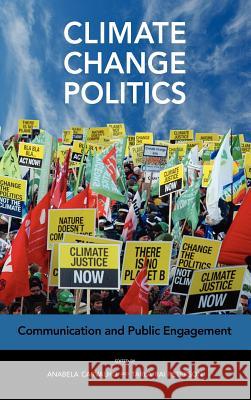Climate Change Politics: Communication and Public Engagement » książka
Climate Change Politics: Communication and Public Engagement
ISBN-13: 9781604978230 / Angielski / Twarda / 2012 / 398 str.
Climate Change Politics offers a critical, yet hopeful examination of political vitality in the politics of climate change and discusses how people use various forms of communication to challenge existing power hierarchies. Because the meanings of climate change and of the numerous aspects of reality associated with it are constructed through communication, we offer an analysis of communication practices and structures as constitutive of climate change politics. A broad variety of case studies demonstrate how the choices made within various forms of public engagement result from social interaction based on communication. The editors of the volume follow Chantal Mouffe in describing "the political" as engagement with processes of debate and decision making on collective issues where different values, preferences, and ideals are played out and opposed. This book examines communication as a key component of climate change politics and shows how climate change communication has the potential to invigorate civic politics. It analyzes how citizens represent, construct, and circulate ideas about climate change and how these practices relate to decisions and public policies, as well as to political identities. Contributing authors explore how changes in the ways information is produced and consumed have contributed to new spaces for political engagement. They analyze a range of semiotic resources and practices within which the meanings of climate change are negotiated. By looking at the multiple ways people experience and communicate about climate change, the analysis extends beyond the cognitive to include emotional, aesthetic, and other epistemologies that shape political engagement with this issue. Individual chapters examine various forms of climate change communication, including artistic expression ranging from installations to cinema, on web-based spaces, and on other alternative media. Working from the premise that communicative practices provide the basis for broad public engagement, this book identifies and examines how the possibilities entailed in that engagement may yet contribute to a transformation of climate change politics that empowers both individual political subjects and their communities. Climate Change Politics is likely to be of interest to a variety of audiences including researchers and students of climate change politics, environmental communication, and social movements in disciplines such as communication, geography, political science, and sociology. The book is suitable as a textbook for both advanced undergraduate and graduate courses on climate change and society; environmental communication; and science, technology, and society.











